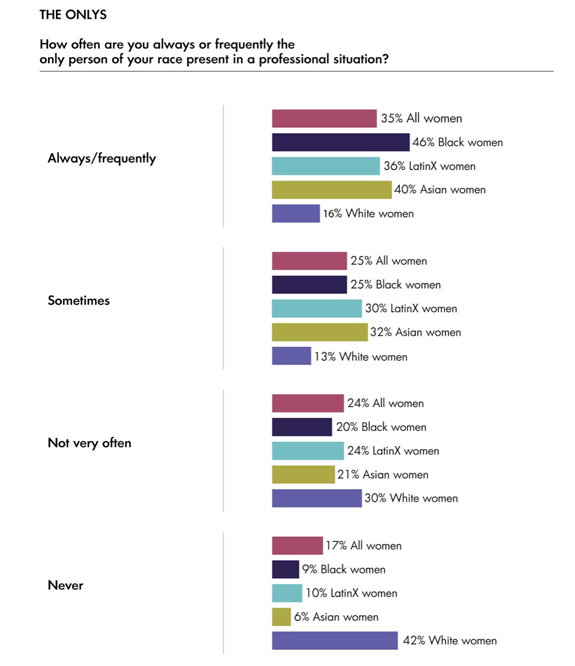Far too many women of colour are ‘still the only’ in their workplaces, according to a recent US survey.
It revealed that 46% of Black women, last year, were ‘frequently’ or ‘always’ the only person of their race in a professional setting, down just one point from 2019. Around 40% of Asian women and around 36% of Latin women also said they were the only in the room, frequently or always. By contrast, 72% of White women said they were ‘not very often’ or ‘never the only’ person of their race in a professional setting; again down by one point from 2019.
The study entitled Women of Color in Business: Cross Generational Survey was carried out by business leaders and Harvard Business School alumnae Bonita C Stewart and Jacqueline Adams, Quadrant Strategies and the Executive Leadership Council (ELC). Their latest research involved nearly 2,500 respondents across all generations, including Gen Z, Millennials, Gen X and Boomers amongst Black, Latin, Asian and Caucasian women, as well as White male manager respondents.

COST OF ‘ONLYNESS’
This ‘onlyness’ has costs, noted the report authors. Twice as many Black women as their White counterparts said they faced extra scrutiny of their job applications and job performances because of their race. Large majorities of all of the female desk workers reported additional stress on the job as a result of the Covid-19 pandemic; 70% for Black, 72% for Latin, 60% for Asian and 67% for White women. Female desk workers also reported additional stress as a result of the racial and social justice protests: 54% for Black, 39% for Latin, 34% for Asian and 30% for White women.
The report also reveals that if leaders want to win the race for exceptional talent, they must get comfortable with hiring underrepresented minorities in multiples. Additionally, they must provide honest feedback and stretch assignments, and create an inclusive environment for ideas to flow freely from all employees across all generations, genders and races.

STRETCH ASSIGNMENTS A MUST
The authors advocate strongly for stretch assignments to increase the skills and opportunities for women of colour in the workplace. For the first time, they included questions about stretch assignments in the 2020 survey. Around 62% of White male managers said they have received a stretch assignment within the last 12 months, compared to just 44% Black, 36% Latin, 37% Asian and 35% of White female managers.
The findings confirmed that this strategy works well for White male managers and is making a dent among women managers, especially Black female managers. However, unless leaders provide the same stretch assignments and opportunities for women, and particularly women of colour, they are likely to lose this valuable diverse talent. In fact, the report found that 29% of Black women have a business they run or are developing in their free time, compared to just 15% Latinx women, 11% of Asian women, and 10% of White women. The authors call this phenomenon ‘side-preneurship’ or the ‘side hustle’; and were struck by the three-times engagement of Black women versus Asian and White women.

GREAT MANAGERS MATTER
Of course, “great managers also matter”, noted the findings. When asked about mentoring, female managers of all races were more magnanimous in their willingness to help anyone regardless of race or gender, ranging from 56%-65%. Yet, only 34% of White male managers concurred. Around 51% preferred to give, and 61% preferred to receive, advice on the job from other White men because: “I feel I can better identify with them”.
“The bottom line is that great leaders and managers – male and female – want to win,” stated co-authors Stewart and Adams. “We advocate for a commitment to manager excellence through additional manager training and finding ways to create psychological safety so that everyone; especially the White male managers, can confidently ‘team up’ with highly qualified, ambitious women of colour.”
Commenting on the report findings, ELC’s President and CEO Michael C Hyter, stated: “The past several months have seen multiple Black women make history rising to CEO positions in Fortune 500 companies; and the highest leadership positions in government. The issue is not the lack of qualified Black women. It’s the lack of opportunity for Black women to ascend to these roles.”

The survey’s findings directly aligns with ELC’s purpose of increasing the number of successful Black executives by adding value to their development, leadership and philanthropic endeavours across the life cycle of their careers, according to Hyter. “The ELC is proud to support this research to empower and energise Black women; and enlighten their organisations, as they strive for future career success,” he added.
Click here for more information about the report.








































